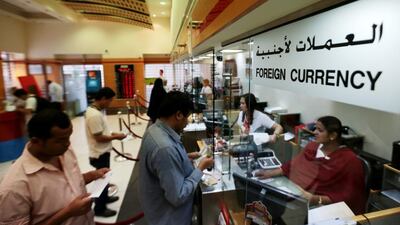ABU DHABI // Indian labourers are making a crucial difference to their families’ living conditions back home, a study has found.
The study by Dr Michael Clemens, a director of research at the US think tank Centre for Global Development, was published in the Ministry of Labour's Al'amal magazine.
Researchers interviewed 1,500 Indian workers to measure the effects their working here has had on their families at home.
One of the main findings was that the labourers were earning salaries that were two and a half times more than what they would have earned in India.
The remittances they send home were also improving their families’ situation.
“The fact is that Indians moving to work in the UAE have contributed to the reduction of poverty, obtained hundreds of thousands of jobs, and provided Indian families with billions of dollars, which were transferred by workers from their average monthly earnings,” the survey said.
It was also found that the labourers’ families were 30 per cent more likely to own their own businesses when compared to families with no members working abroad.
But the Indian workers who had come to work in the UAE before the global financial crisis of 2008 had greater opportunities as compared to workers that came after the crisis.
The workers said they agreed with the findings of the study.
Sukhvinder Singh, 25, has been working in Al Ain since 2007, first as a manual labourer and then as a machine operator.
He sends about Dh1,700 a month to his wife and son back home.
“I don’t have a choice and have to work here as the money is good,” he said.
“I would not be able to save as much if I were in India as I am a high school graduate. My child is young but as I am here, I will be able to afford his education.
“There are hardships here. It is extremely hot and the work is difficult, but with my education, earning this kind of salary in India is difficult.”
Rajeev Kumar, 27, moved to UAE from India seven years ago and works in the carpeting industry in Dubai.
“I would not have stayed here so long if it had not helped my family. I used to earn around Dh900 and now I can earn over Dh1,000, plus overtime,” he said. “The company I work for pays for our day-to-day expenditure and accommodation, thus I only need to keep Dh200 to Dh300, and send the rest home to my parents.”
Dr Jane Bristol-Rhys, an associate professor of anthropology at Zayed University, said the study was limited in its scope.
“The study seems to have focused narrowly on financial gains, but what about the emotional impact? In India many children are seeing their fathers only once in two years. The study has not taken this into account,” said Dr Bristol-Rhys, who has studied migration in the UAE since 2001 and has written a book about it that will be available this year.
“The study also seems to have ignored work done by anthropologists in India as well as the UAE for the past 20 years. These have not been referenced. We know that the individual families are benefiting but is the community benefiting? The local villages do not benefit. Instead, the government takes a large chunk of the remittances that are sent.
“The people working in the Gulf are also under pressure to bring back gifts with them. In many cases, they take loans to go work and then have to stay for two-three contracts to earn the money back.”
arizvi2@thenational.ae


